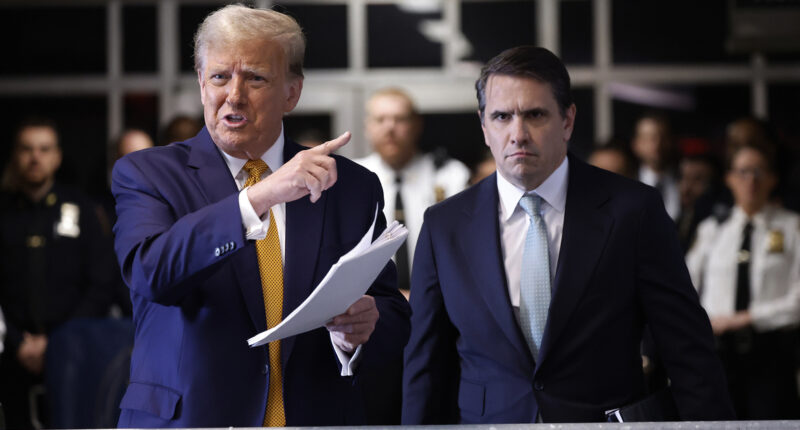Share this @internewscast.com
Then-candidate Donald Trump speaks with members of the media as attorney Todd Blanche listens before the start of his trial at Manhattan criminal in New York, Tuesday, May 14, 2024 (Michael M. Santiago/Pool Photo via AP).
What happens when a former president, after facing criminal charges yet avoiding any findings of guilt, files for compensation against the government seeking $230 million due to extensive legal challenges and expenses, reclaims the presidency, and places trusted allies in the Department of Justice, who then might have the authority to approve such claims?
On Tuesday, the legal community was buzzing following a New York Times article that brought these issues to light, focusing on President Donald Trump’s undisclosed claim regarding the Russia investigation and a known grievance over the dismissed special counsel Jack Smith’s probe into classified documents.
The Times clarified that these administrative claims act as precursors to potential lawsuits. Deputy Attorney General Todd Blanche, who previously defended Trump in the Mar-a-Lago case, and newly confirmed Associate Attorney General Stanley Woodward, Jr., former counsel to Trump’s ex-co-defendant Walt Nauta and FBI Director Kash Patel, are the officials authorized by the Justice Manual to approve any substantial administrative claim settlements, according to the report.
The article also included a pointed critique from Bennett Gershman, a law professor and ethics expert at Pace University.
“This is a travesty,” Gershman commented. “The ethical conflict here is so blatant and fundamental that it doesn’t take a law professor to point it out.”
“Having individuals within the Justice Department decide the outcome of his claim, especially when they are serving under him, seems almost too incredible to be real,” he continued. “It’s bizarre and nearly defies belief.”
Trump himself acknowledged the “awfully strange” nature of the situation in comments from the White House on Tuesday.
Trump: “It’s awfully strange to make a decision where I’m paying myself. But I was damaged very greatly and any money I would get I would give to charity.” pic.twitter.com/k7MVfcZX6z
— Aaron Rupar (@atrupar) October 21, 2025
“It’s awfully strange to make a decision where I’m paying myself. In other words, did you ever have one of those cases, where you have to decide how much you’re paying yourself in damages?” he asked. “But I was damaged very greatly and any money I would get I would give to charity.”
Just one week prior, Trump inaccurately described his tort claim as a lawsuit, which he said “was doing very well[.]”
“[A]nd when I became president I said, ‘I’m sort of suing myself.’ I don’t know, how do you settle the lawsuit, I’ll say give me X dollars, and I don’t know what to do with the lawsuit,” he said. “It sort of looks bad, I’m suing myself, right?”
In the Mar-a-Lago-related claim submitted months prior to his reelection, Trump assigned blame to then-U.S. Attorney General Merrick Garland and ex-FBI Director Christopher Wray for engaging in “clear dereliction of constitutional principles, inconsistent standards as applied to the prospective plaintiff, and a clear intent to engage in political persecution” by pushing ahead with the Mar-a-Lago search without his “consent.”
Trump alleged that the feds’ August 2022 search amounted to “tortious conduct” that, among other things, substantially racked up already exorbitant legal bills.
In alleging damages, the tort claim memo said that the DOJ and FBI’s “oppression, wantonness, and reckless disregard of President Trump’s rights” in his case caused him “actual harm” to the tune of $15 million in legal bills, tacking on to the “legal costs of over $60 million per year since shortly after he left office,” according to a footnote at the end of the filing.
CNN senior legal analyst Elie Honig, in response to a question on air Tuesday about whether Trump had “any legitimate grounds for this claim […] about damages for someone who went through these investigations and had to pay their lawyers,” stated that the “legal bar” is typically “very high” in showing “malice” on the part of the investigating feds, particularly when one considers the feds actually found classified documents at Mar-a-Lago after a federal judge signed off on the search warrant.
More to the point, Honig said, there is a “massive, I believe, intractable conflict of interest problem here” that should at least lead to Blanche’s recusal.
The legal analyst, a former federal and state prosecutor, said that would be the “easiest recusal decision in the Justice Department history.”
“We’ve got a massive, I believe intractable, conflict of interest problem here.”
CNN Senior Legal Analyst and former Assistant U.S. Attorney for the Southern District of New York @eliehonig speaking with @sarasidnerCNN on @CNN @NewsCentralCNN
via #StudiGo pic.twitter.com/U957PTZFbr
— StudiGo (@StudiGo_LLC) October 22, 2025
Law&Crime asked NYU law professor emeritus Stephen Gillers, a leading legal ethics expert, what should be done — and what comes next.
In response, Gillers emphasized that if these claims do end up settled, as they appear on track to be, the DOJ will have to “justify” the payout in a “public document.”
“Paying the legal fees of an official who is charged with misconduct in his official capacity is recognized as legitimate if the official is exonerated or the matter is settled without admission of wrongdoing. Corporate America does it and governments do it,” Gillers said. “The problem arises here where, those who may in other cases have to approve the payment as in accord with government policy, are presidential appointees, subject to removal at his discretion, coupled with the fact as I understand it that some of those legal fees will have gone to the very officials positioned to give approval.”
“That would be unacceptable,” he added. “So if ordinarily some of these fees would be reimbursed under DOJ policy, the only solution is for career DOJ officials to make the decision and to explain their decision and to justify the amounts in a public document with reference to established policy.”
Gillers said that whatever the amount ends up being, whoever approves it “must review the charges and eliminate any that are excessive or duplicative and must explain those decisions in a public document,” subtracting “from any amount to which Trump would be entitled” fees that were already “met through fundraising.”
In a follow-up answer on the question of recusal, Gillers touched on another subject: Trump’s payment of his lawyers.
“Presumably, any lawyer who stands to benefit would be in that position because his or her fees have not yet been fully paid. That lawyer should not decide whether or not any of his or her own fees should be reimbursed,” he said. “This would be true both under the legal ethics rules and under the Ethics in Government Act.”
“But as I said, if that lawyer’s job is subject to the discretion of the president, he or she should not participate in any event,” Gillers concluded.
In response to the Times’ Blanche and Woodward recusal question, DOJ spokesman Chad Gilmartin reportedly answered that “In any circumstance, all officials at the Department of Justice follow the guidance of career ethics officials.”
Notably, AG Pam Bondi sent one of those career officials packing in July.
Melissa Flagg and Eric Lee are listed on the DOJ’s website as attorney advisors to the Office of the Attorney General, the Office of the Deputy Attorney General, and the Office of the Associate Attorney General.















